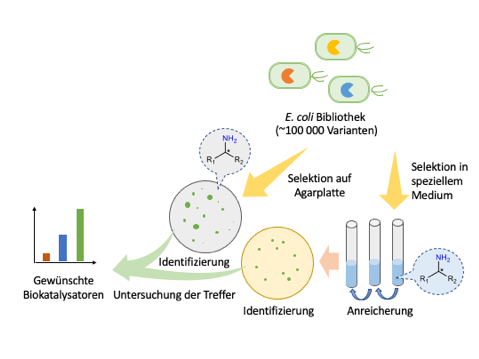The chemical production of new active ingredients for medicine is a complex process in which the main objective is to obtain biologically effective molecules with high levels of selectivity. In general, enzymes can be used as biocatalysts to produce specific compounds with the desired effects. However, natural biocatalysts require optimisation for these syntheses. "You have to imagine there being mirror-image molecules that differ from one another like a left and right hand. If both types are used in a mixture, severe side effects may occur. This can be avoided by selecting only those molecules that actually achieve the desired effect," explains Prof. Uwe Bornscheuer from the Institute of Biochemistry at the University of Greifswald.
The concept developed by Professor Bornscheuer's team together with scientists from China and the Helmholtz-Zentrum Berlin (HZB), can now be used to quickly generate the desired highly selective enzymes with the required properties. "Starting with enzymes with very low activity for the target compound, we succeeded in screening about 100,000 variants of the biocatalysts within a very short time, using a sensitive growth assay, i.e. standardised analyses, for E. coli bacteria, and were thus able to identify suitable enzymes," explains Professor Bornscheuer. Instead of taking several months to find these catalysts using complex analytical procedures, the desired enzyme can now be found within one or two weeks, as only active enzymes in the assay on agar plates lead to the growth of the E. coli bacteria (image).
Prof. Dr. Shuke Wu, a former scholarship holder from the Alexander von Humboldt Foundation at the Institute of Biochemistry, who played a leading role in this research success and is now a professor in Wuhan (China), adds: "We have succeeded in establishing this principle of growth assay as an ultra-high throughput screening method for three different enzyme classes and three target molecules. In this way, we have now been able to show that the optimised biocatalysts can be used to produce important intermediate stages for the active ingredients linagliptin and cinacalcet with high levels of activity and selectivity."
The concept that has now been developed is broadly applicable to a wide range of challenges in organic synthesis and makes it possible to establish efficient biocatalysts for the sustainable production of active ingredients, because, in contrast to conventional chemical processes, heavy metals and solvents are not required.
Further information
to the article
Research Group Prof. Dr. Uwe Bornscheuer
Institute of Biochemistry
Prof. Shuke Wu (Huazhong Agricultural University (HZAU), China)
Research Group Macromolecular Crystallography (Helmholtz Institute Berlin)
Dr. Gert Weber (Helmholtz-Zentrum Berlin)
Contact at the University of Greifswald
Prof. Dr. Uwe Bornscheuer
Biotechnology and Enzyme Catalysis
Institute of Biochemistry
Felix-Hausdorff-Straße 4, 17489 Greifswald
Tel.: +49 3834 420 4367
uwe.bornscheueruni-greifswaldde

